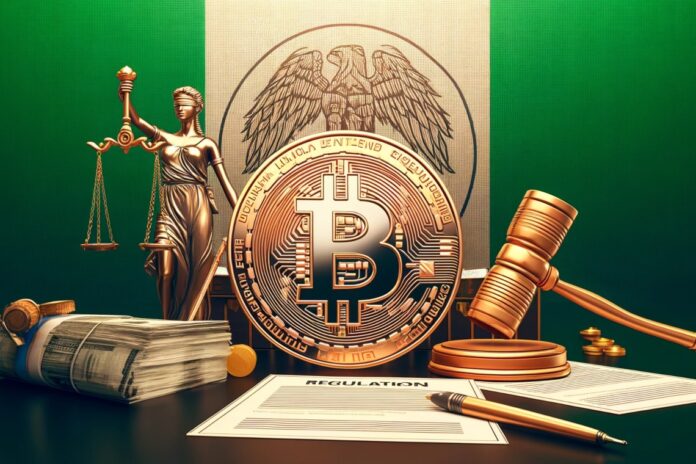Despite the recent introduction of a new regulation in Nigeria that would see the suppression of P2P crypto exchanges, the attention and interest in Bitcoin remains unchanged and generally high within the African country.
According to the latest data from Google Trends, the stringent regulation proposed by President Tinubu and the pressures against cryptocurrency activities have not affected the sentiment of the Nigerian population, which with Bitcoin and stablecoin manages to survive inflation.
Let’s see all the details below.
Summary
Nigeria and crypto: interest in Bitcoin remains stable and is not influenced by stringent regulations
On May 7 Bloomberg reported the introduction of a new regulatory framework in Nigeria where peer-to-peer (P2P) crypto trades were banned, with President Tinubu motivated to strictly regulate and put pressure on the digital asset sector.
All this has not changed in any way the sentiment of the Nigerian population regarding Bitcoin and crypto, whose interest remains generally high.
In fact, according to statistics from Google Trends, Nigeria still represents the largest highlight for cryptocurrencies in Africa, where searches for coins like Bitcoin on the search engine are a daily occurrence.
In fact, it rises to the first country for interest in Bitcoin and crypto, followed by the cryptographic hub of El Salvador, where President Nayib Bukele is particularly proactive in supporting this type of alternative economy.
Source: https://trends.google.it/trends/explore?date=today%205-y&geo=NG&q=bitcoin&hl=it
The geographical analysis of the study highlights how the state of Delta acts as the area with the most involvement for this kind of research, followed by other states such as Anambra, Ekiti, Enugu, Ondo, Ebonyi, Bayelsa, Osun, Edo, and Imo.
Surprisingly, Lagos, the center of commerce in Nigeria, does not show a high desire for Bitcoin, so much so that it does not rank among the top 15 cities in terms of interest in searches on Google Trends.
This confirms the thesis that Bitcoin and other crypto manage to find fertile ground to take root within a society in daily exchanges, and more generally in culture, when we find a high percentage of people excluded from basic financial services and where there are levels of inflation out of control.
In particular in Nigeria, the middle class seeks to protect their initial savings from inflation by using Bitcoin and Tether (USDT).
This polarization between the government and citizens regarding the crypto topic could lead to strong internal tensions, with President Tinubu motivated to support oppressive regulatory standards by banning P2P exchanges and the Nigerian population increasingly inclined to use the mentioned alternatives rather than the Nigerian Naira.
The firm stance of the regulatory body was demonstrated earlier this year when it imposed a ban on Binance operations in Nigeria, followed by the arrest and detention of its top executives, Tigran Gambaryan and Nadeem Anjarwalla.
Furthermore, the Securities Exchange Commission (SEC) of Nigeria has accused Binance of market manipulation, blaming it for contributing to the devaluation of the naira and necessitating government intervention.
It should also be noted that in the country, banks still could not hold virtual assets within their portfolios and trade cryptocurrencies on behalf of their clients.
Bitcoin is primarily aimed at the unbanked and millennials
As mentioned in the previous paragraph, Bitcoin and crypto usually gain more appeal in populations like Nigeria where there is a strong concentration of the so-called “unbanked”, that is, adults who do not have their own bank account and cannot access basic financial services.
In this case, cryptocurrencies like Tether represent a valid alternative solution because they allow value exchange in P2P, without any State censorship affecting the successful completion of transactions (except for the censorships internal to Tether).
Furthermore, Bitcoin and company find greater interest among millennials rather than in other types of generations, where the technological component has not yet reached the sphere of money and personal finance.
Regarding Nigeria, according to a United Nations study, the country is currently one of the youngest in the world and simultaneously one of the fastest-growing in Africa, with 43% of the population being under the age of 15.
Another factor that must be considered to understand where the crypto economy finds more interest is the level of inflation of a country and the solidity of the state currency.
Returning to the example of Nigeria, in this context the heavy devaluation of the naira, which has fallen by 86% against the euro since 2016, has pushed citizens to consider alternative options to preserve the value of their assets.
If in the West we are used to seeing the purchasing power of our account more or less always the same (with the first warning signs also ringing here), we cannot say the same for Nigeria, where at any moment the value of the population’s sacrifices could be worth 20% less.
Regarding the ability to maintain value as an asset store of value, Bitcoin still serves as the preferred choice for Nigerians.
While regarding the use of a currency for daily transactions, Nigerians do not use the lighting network, but prefer to rely on Tether, which is currently dominating the market for local business exchanges, especially after the diaspora regulation that bans P2P exchanges.




